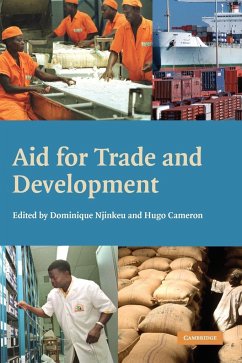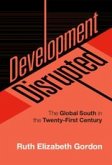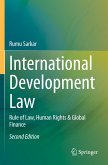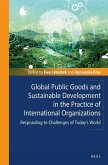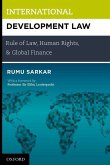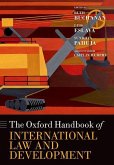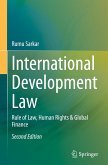Hugo Cameron / Dominique Njinkeu (eds.)
Aid for Trade and Development
Herausgeber: Njinkeu, Dominique; Cameron, Hugo
Hugo Cameron / Dominique Njinkeu (eds.)
Aid for Trade and Development
Herausgeber: Njinkeu, Dominique; Cameron, Hugo
- Gebundenes Buch
- Merkliste
- Auf die Merkliste
- Bewerten Bewerten
- Teilen
- Produkt teilen
- Produkterinnerung
- Produkterinnerung
This book traces the evolution of Aid for Trade and examines the global architecture, modalities, and costs associated with its implementation.
Andere Kunden interessierten sich auch für
![Development Disrupted Development Disrupted]() Ruth Elizabeth GordonDevelopment Disrupted97,99 €
Ruth Elizabeth GordonDevelopment Disrupted97,99 €![International Development Law International Development Law]() Rumu SarkarInternational Development Law104,99 €
Rumu SarkarInternational Development Law104,99 €![Global Public Goods and Sustainable Development in the Practice of International Organizations Global Public Goods and Sustainable Development in the Practice of International Organizations]() Global Public Goods and Sustainable Development in the Practice of International Organizations193,99 €
Global Public Goods and Sustainable Development in the Practice of International Organizations193,99 €![International Development Law International Development Law]() Rumu SarkarInternational Development Law195,99 €
Rumu SarkarInternational Development Law195,99 €![The Oxford Handbook of International Law and Development The Oxford Handbook of International Law and Development]() Ruth BuchananThe Oxford Handbook of International Law and Development189,99 €
Ruth BuchananThe Oxford Handbook of International Law and Development189,99 €![International Development Law International Development Law]() Rumu SarkarInternational Development Law104,99 €
Rumu SarkarInternational Development Law104,99 €![The Perils of International Capital The Perils of International Capital]() Faisal Z AhmedThe Perils of International Capital108,99 €
Faisal Z AhmedThe Perils of International Capital108,99 €-
-
-
This book traces the evolution of Aid for Trade and examines the global architecture, modalities, and costs associated with its implementation.
Produktdetails
- Produktdetails
- Verlag: Cambridge University Press
- Seitenzahl: 448
- Erscheinungstermin: 24. Dezember 2007
- Englisch
- Abmessung: 260mm x 183mm x 29mm
- Gewicht: 1048g
- ISBN-13: 9780521889513
- ISBN-10: 0521889510
- Artikelnr.: 26183560
- Herstellerkennzeichnung
- Libri GmbH
- Europaallee 1
- 36244 Bad Hersfeld
- gpsr@libri.de
- Verlag: Cambridge University Press
- Seitenzahl: 448
- Erscheinungstermin: 24. Dezember 2007
- Englisch
- Abmessung: 260mm x 183mm x 29mm
- Gewicht: 1048g
- ISBN-13: 9780521889513
- ISBN-10: 0521889510
- Artikelnr.: 26183560
- Herstellerkennzeichnung
- Libri GmbH
- Europaallee 1
- 36244 Bad Hersfeld
- gpsr@libri.de
ILEAP is an independent, not-for-profit organization whose overriding goal is to promote pro-development outcomes in international negotiations. Established in 2002, ILEAP provides professional backstopping capacity and support in trade negotiations to a variety of beneficiaries in Africa and the Caribbean. ILEAP provides practical, timely, and independent inter-disciplinary trade advice and assistance in trade negotiations to developing countries.
Part I. Aid for Trade Genesis and Architecture: 1. Aid for Trade: helping
developing countries benefit from trade opportunities Bernard Hoekman; 2.
Aid for Trade: an essential component of the multilateral trading system
and the WTO Doha Development agenda Faizel Ismail; 3. Aid for Trade: how we
got here, where we might go Michael Finger; 4. Financing international
public goods: a framework to address Aid for Trade Dirk Willem te Velde; 5.
Aid for Trade: a new issue in the WTO Sheila Page; 6. Scale and types of
funds for Aid for Trade Massimiliano Calì; 7. An African perspective on Aid
for Trade Dominique Njinkeu et al.; Part II. Aid for Trade in Action: 8.
Lessons from the Tanzanian experience in trade capacity building Bede Lyimo
and Edward Sungula; 9. Lessons from the Cambodian experience in trade
capacity building Sok Siphana; 10. Lessons learned delivering Aid for Trade
in Latin America and the Caribbean: the role of the Inter-American
Development Bank Antoni Estevadeordal, Paolo Giordano, Anneke Jessen,
Jessica Luna and Kati Suominen; 11. Mainstreaming development in trade:
lessons from the Caribbean's experience with the FTAA Hemispheric
Cooperation Program Deryck Brown; 12. Aid for Trade and the European
Development Fund Amanda Sunassee; 13. Services-related projects in Aid for
Trade Pierre Sauvé; 14. Aid for Trade for services in small economies: some
considerations from the Caribbean Ramesh Chaitoo; 15. The role of local
researchers in delivery of Aid for Trade: the case of the African Economic
Research Consortium (AERC) William Lyakurwa, Olu Ajakaiye and Olawale
Ogunkola; 16. The role of international research institutions and networks
in supporting low-income countries in trade policy-making and negotiations
Ann Weston; 17. Civil society perspectives in the Aid for Trade debate Aldo
Caliari; Part III. Way Forward: 18. Aid for Trade and private sector
development Havelock Brewster and Dominique Njinkeu; 19. Regional Aid for
Trade Dirk Willem te Velde.
developing countries benefit from trade opportunities Bernard Hoekman; 2.
Aid for Trade: an essential component of the multilateral trading system
and the WTO Doha Development agenda Faizel Ismail; 3. Aid for Trade: how we
got here, where we might go Michael Finger; 4. Financing international
public goods: a framework to address Aid for Trade Dirk Willem te Velde; 5.
Aid for Trade: a new issue in the WTO Sheila Page; 6. Scale and types of
funds for Aid for Trade Massimiliano Calì; 7. An African perspective on Aid
for Trade Dominique Njinkeu et al.; Part II. Aid for Trade in Action: 8.
Lessons from the Tanzanian experience in trade capacity building Bede Lyimo
and Edward Sungula; 9. Lessons from the Cambodian experience in trade
capacity building Sok Siphana; 10. Lessons learned delivering Aid for Trade
in Latin America and the Caribbean: the role of the Inter-American
Development Bank Antoni Estevadeordal, Paolo Giordano, Anneke Jessen,
Jessica Luna and Kati Suominen; 11. Mainstreaming development in trade:
lessons from the Caribbean's experience with the FTAA Hemispheric
Cooperation Program Deryck Brown; 12. Aid for Trade and the European
Development Fund Amanda Sunassee; 13. Services-related projects in Aid for
Trade Pierre Sauvé; 14. Aid for Trade for services in small economies: some
considerations from the Caribbean Ramesh Chaitoo; 15. The role of local
researchers in delivery of Aid for Trade: the case of the African Economic
Research Consortium (AERC) William Lyakurwa, Olu Ajakaiye and Olawale
Ogunkola; 16. The role of international research institutions and networks
in supporting low-income countries in trade policy-making and negotiations
Ann Weston; 17. Civil society perspectives in the Aid for Trade debate Aldo
Caliari; Part III. Way Forward: 18. Aid for Trade and private sector
development Havelock Brewster and Dominique Njinkeu; 19. Regional Aid for
Trade Dirk Willem te Velde.
Part I. Aid for Trade Genesis and Architecture: 1. Aid for Trade: helping
developing countries benefit from trade opportunities Bernard Hoekman; 2.
Aid for Trade: an essential component of the multilateral trading system
and the WTO Doha Development agenda Faizel Ismail; 3. Aid for Trade: how we
got here, where we might go Michael Finger; 4. Financing international
public goods: a framework to address Aid for Trade Dirk Willem te Velde; 5.
Aid for Trade: a new issue in the WTO Sheila Page; 6. Scale and types of
funds for Aid for Trade Massimiliano Calì; 7. An African perspective on Aid
for Trade Dominique Njinkeu et al.; Part II. Aid for Trade in Action: 8.
Lessons from the Tanzanian experience in trade capacity building Bede Lyimo
and Edward Sungula; 9. Lessons from the Cambodian experience in trade
capacity building Sok Siphana; 10. Lessons learned delivering Aid for Trade
in Latin America and the Caribbean: the role of the Inter-American
Development Bank Antoni Estevadeordal, Paolo Giordano, Anneke Jessen,
Jessica Luna and Kati Suominen; 11. Mainstreaming development in trade:
lessons from the Caribbean's experience with the FTAA Hemispheric
Cooperation Program Deryck Brown; 12. Aid for Trade and the European
Development Fund Amanda Sunassee; 13. Services-related projects in Aid for
Trade Pierre Sauvé; 14. Aid for Trade for services in small economies: some
considerations from the Caribbean Ramesh Chaitoo; 15. The role of local
researchers in delivery of Aid for Trade: the case of the African Economic
Research Consortium (AERC) William Lyakurwa, Olu Ajakaiye and Olawale
Ogunkola; 16. The role of international research institutions and networks
in supporting low-income countries in trade policy-making and negotiations
Ann Weston; 17. Civil society perspectives in the Aid for Trade debate Aldo
Caliari; Part III. Way Forward: 18. Aid for Trade and private sector
development Havelock Brewster and Dominique Njinkeu; 19. Regional Aid for
Trade Dirk Willem te Velde.
developing countries benefit from trade opportunities Bernard Hoekman; 2.
Aid for Trade: an essential component of the multilateral trading system
and the WTO Doha Development agenda Faizel Ismail; 3. Aid for Trade: how we
got here, where we might go Michael Finger; 4. Financing international
public goods: a framework to address Aid for Trade Dirk Willem te Velde; 5.
Aid for Trade: a new issue in the WTO Sheila Page; 6. Scale and types of
funds for Aid for Trade Massimiliano Calì; 7. An African perspective on Aid
for Trade Dominique Njinkeu et al.; Part II. Aid for Trade in Action: 8.
Lessons from the Tanzanian experience in trade capacity building Bede Lyimo
and Edward Sungula; 9. Lessons from the Cambodian experience in trade
capacity building Sok Siphana; 10. Lessons learned delivering Aid for Trade
in Latin America and the Caribbean: the role of the Inter-American
Development Bank Antoni Estevadeordal, Paolo Giordano, Anneke Jessen,
Jessica Luna and Kati Suominen; 11. Mainstreaming development in trade:
lessons from the Caribbean's experience with the FTAA Hemispheric
Cooperation Program Deryck Brown; 12. Aid for Trade and the European
Development Fund Amanda Sunassee; 13. Services-related projects in Aid for
Trade Pierre Sauvé; 14. Aid for Trade for services in small economies: some
considerations from the Caribbean Ramesh Chaitoo; 15. The role of local
researchers in delivery of Aid for Trade: the case of the African Economic
Research Consortium (AERC) William Lyakurwa, Olu Ajakaiye and Olawale
Ogunkola; 16. The role of international research institutions and networks
in supporting low-income countries in trade policy-making and negotiations
Ann Weston; 17. Civil society perspectives in the Aid for Trade debate Aldo
Caliari; Part III. Way Forward: 18. Aid for Trade and private sector
development Havelock Brewster and Dominique Njinkeu; 19. Regional Aid for
Trade Dirk Willem te Velde.

